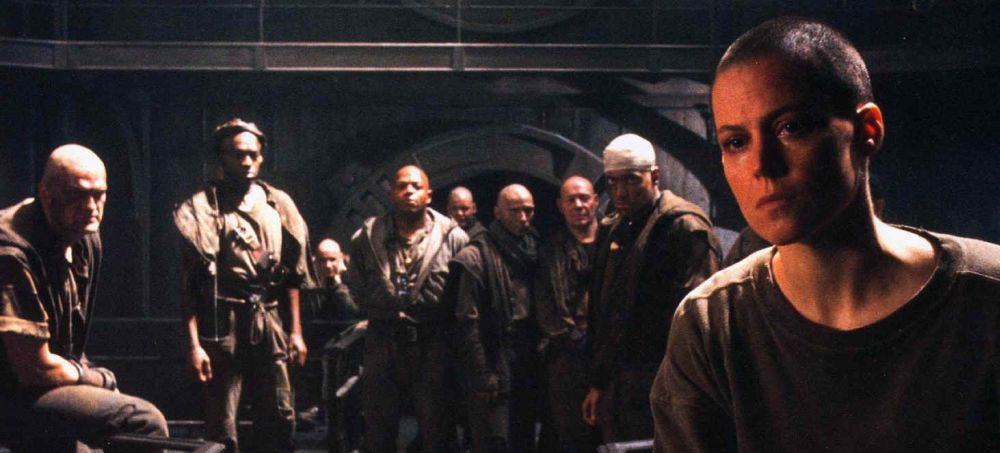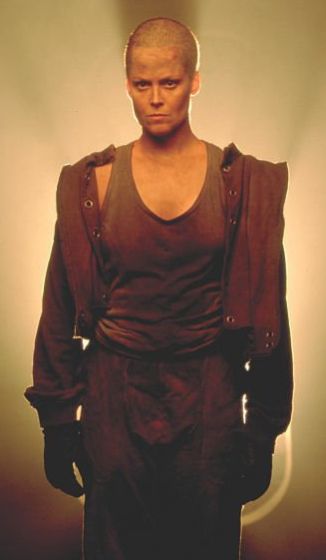 ★½
★½
“Lost in space.”
“No one hated it more than me. To this day, no one hates it more than me.”
— David Fincher
Few films have had such a troubled path to the screen. The story of those struggles, and the various versions of the story generated by William Gibson, Eric Red, David Twohy, Vincent Ward and others, is probably worthy of an entire separate article. For now, we concentrate on what finally came out, but let’s quote writer Rex Pickett:
“I was hired by 20th Century Fox four weeks prior to the start of principal photography… First on my agenda was a complete rewrite of the second half of the Walter Hill/David Giler screenplay due to certain major character and narrative changes mandated by Walter Hill. Once that was accomplished I was to attend to the first half and write an amalgamated version which was to include scenes from their draft and new scenes that I wrote. Thus, the resultant screenplay – particularly the first half – contains scenes that I was instructed to include whether I wanted to or not.”
The end result is every bit as awful and borderline incoherent as you’d expect, given the circumstances. At the time, Fincher had no feature-film experience. He was known almost entirely for music videos, particularly for Madonna – when it was announced he would be helming the third part, I recall idly wondering if we were going to see the aliens in pointy bras. That isn’t quite the case, and it does make more sense in the light of Fincher’s subsequent work, from Seven through to the The Girl With The Dragon Tattoo remake. But it’s worth considering that neither Ridley Scott nor James Cameron had worked on a large-budget sci-fi flick before their entries – Cameron had made The Terminator, but it was low-budget, at barely one-third the cost of Aliens. Both seemed to deliver a more consistent vision, though I suspect neither suffered from the copious degree of studio interference apparently seen here.
 Right from the get-go, the script basically junks its predecessor. An emergency on the spacecraft bringing Ripley, Newt, Hicks and Bishop home causes it crash-land, with Ripley apparently the only survivor. It’s a near-derelict former prison planet, which was about to be decommissioned, but the inhabitants, under spiritual leader Dillon (Dutton), opted to stick around, under minimal supervision. They’re none too happy to have a woman dropped into the middle of their society, and a message is sent to request Ripley be removed as soon as possible. Needless to say the Weyland-Yutari Corporation are more than happy to oblige. However, it soon becomes clear that Ripley was not the only living thing to escape the crash, as local residents start turning up “diced.” When it’s confirmed, through Ripley re-activating Bishop, that there was indeed an alien present: destroying it is necessary, not only to survive, but also to stop it from falling into the hands of Weyland-Yutari.
Right from the get-go, the script basically junks its predecessor. An emergency on the spacecraft bringing Ripley, Newt, Hicks and Bishop home causes it crash-land, with Ripley apparently the only survivor. It’s a near-derelict former prison planet, which was about to be decommissioned, but the inhabitants, under spiritual leader Dillon (Dutton), opted to stick around, under minimal supervision. They’re none too happy to have a woman dropped into the middle of their society, and a message is sent to request Ripley be removed as soon as possible. Needless to say the Weyland-Yutari Corporation are more than happy to oblige. However, it soon becomes clear that Ripley was not the only living thing to escape the crash, as local residents start turning up “diced.” When it’s confirmed, through Ripley re-activating Bishop, that there was indeed an alien present: destroying it is necessary, not only to survive, but also to stop it from falling into the hands of Weyland-Yutari.
You can almost take Aliens and this, using them as point-counterpoint examples, of how you should and should not handle almost every aspect of genre film-making. Aliens built logically upon what had gone before, but this throws it all out the window, apparently making the rules of engagement up as it goes along. Aliens was a near-textbook example of how to create supporting characters with a few simply brush-strokes, giving them character and motivation: this has very little beyond a bunch of unlikeable bald-headed monk/prisoner types, with absolutely no reason provided for the audience to care about anyone beyond Ripley, as they get picked off. The pacing is terrible too, with little or no sense of progression or any significant twists, beyond the one that Ripley finds out about herself. And that makes no logical sense, given what we learned about the alien’s life-cycle in the first two movie. Everyone – Ripley, the prisoners and even the marauding alien – seems to be in a holding pattern, waiting for the corporate ship to show up so something (pleasegodanythingatall) can happen.
Without wishing to give away too much about the finale, it bears more than a slight resemblance to the one used by Aliens director Cameron in Terminator 2, which came out the previous year. He later told the BBC, “I couldn’t stand Alien 3 – how they could just go in there and kill off all these great characters we introduced in Aliens, and the correlation between mother and daughter. It stunk.” So was the similarity coincidence? Or did Cameron see a script during the long, pre-production process and opt to swipe it, to thumb his nose at the makers for basically jettisoning his entire contribution to the series? I’d like to think it was the latter, but suspect it was indeed one of those Hollywood flukes.
However, it’d be no better than this massively disappointing movie deserved, with Fincher and co. literally making it up as they went along. The first time I saw it, was on Hollywood Boulevard in Los Angeles, its original theatrical release coinciding with a trip to California. I fell asleep. 20 years later, I saw it for the second time, in the comfort of my own home… I fell asleep again. As Oscar Wilde might have said, “To lose consciousness once, Mr Worthing, may be regarded as a misfortune; to lose it twice looks like carelessness.”
Dir: David Fincher
Star: Sigourney Weaver, Charles S. Dutton, Charles Dance, Brian Glover




